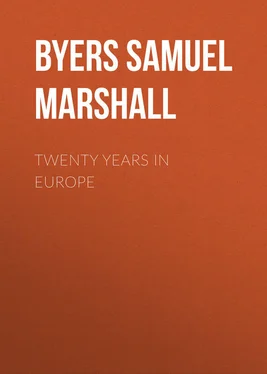Samuel Byers - Twenty Years in Europe
Здесь есть возможность читать онлайн «Samuel Byers - Twenty Years in Europe» — ознакомительный отрывок электронной книги совершенно бесплатно, а после прочтения отрывка купить полную версию. В некоторых случаях можно слушать аудио, скачать через торрент в формате fb2 и присутствует краткое содержание. ISBN: , Жанр: foreign_prose, foreign_antique, foreign_language, на английском языке. Описание произведения, (предисловие) а так же отзывы посетителей доступны на портале библиотеки ЛибКат.
- Название:Twenty Years in Europe
- Автор:
- Жанр:
- Год:неизвестен
- ISBN:http://www.gutenberg.org/ebooks/44296
- Рейтинг книги:4 / 5. Голосов: 1
-
Избранное:Добавить в избранное
- Отзывы:
-
Ваша оценка:
- 80
- 1
- 2
- 3
- 4
- 5
Twenty Years in Europe: краткое содержание, описание и аннотация
Предлагаем к чтению аннотацию, описание, краткое содержание или предисловие (зависит от того, что написал сам автор книги «Twenty Years in Europe»). Если вы не нашли необходимую информацию о книге — напишите в комментариях, мы постараемся отыскать её.
Twenty Years in Europe — читать онлайн ознакомительный отрывок
Ниже представлен текст книги, разбитый по страницам. Система сохранения места последней прочитанной страницы, позволяет с удобством читать онлайн бесплатно книгу «Twenty Years in Europe», без необходимости каждый раз заново искать на чём Вы остановились. Поставьте закладку, и сможете в любой момент перейти на страницу, на которой закончили чтение.
Интервал:
Закладка:
I went often to Constance, and among my acquaintances was one who had been a boyhood friend of the Emperor. It was Dr. J. Marmor, a retired linen merchant in the town. He still corresponded with France’s ex-ruler, for Sedan’s day was over, as was the terrible scene in that little farmhouse by Donghery. Dr. Marmor showed me his letters from Napoleon, and gave me the wax impress of his private seal from one, together with some writing of the Emperor’s.
No one in Constance will forget the day when Napoleon, at the height of his power, came from Paris, to visit the home of his childhood. What grand preparations there were, what decorations, banners, bands, cannon; what a gilded equipage, for the Emperor to head the procession in! Suddenly the train whistle shrieks. “The Emperor! The Emperor!” cries the crowd, as he descends to the carpeted platform. The big, gilded carriage and the flunkies wait. “Where is my friend, Dr. Marmor?” asks the Emperor. He is sitting out there, in his old, one-horse buggy, looking at the scene, hoping for just a glance at Napoleon, as he will pass among the self-appointed bigwigs and flunkies. Suddenly the Emperor sees him, grasps him by the hand, and, springing into the old buggy, cries: “Drive on. To-day I ride with Marmor.” Then Marmor’s one-horse chaise, with nobody in it but the Emperor and himself, heads the procession through the city. At first, everybody stared, and then everybody cheered. Marmor, in five minutes, had become the first man in Constance. That incident has been his pride ever since.
When I called on him, and told him I wanted to write for a magazine something about Napoleon’s boyhood, he gave himself wholly to my service, went with me everywhere, and told of a hundred frolics he and the young prince had had in the neighborhood. Prince Napoleon would have been a poor secretary for the Y. M. C. A. He was an awfully fast boy, according to one who “had been there” and knew all about it. Some other old folks whom I met in Constance, knew things also peppery to relate, were they more than big pranks, or worth the writing down.
Hortense’s chateau is two miles or so outside the town. “Many a time,” said Marmor, “after half a night’s frolic with a few of us here in town, have I galloped with him out home, yelling half the way. It must have been the beer. When we got there, I slept till morning with him in the barn, the place where he had his study. He studied, too, spite of his fastness,” said the doctor. “How he read books! just as people nowadays read newspapers. He read everything, and he remembered it all. He was a generous soul, too; everybody said that. He was a famous youth for his kindness to the poor, just like his mother; only she was better. What a swimmer he was, what a wrestler, what a horseman, what a rake! As to horses,” the doctor went on, “why it was a common habit of his to mount, not by the stirrup, but by a single bound over the crupper and into the saddle.” It is curious now to know that Louis Napoleon once was a captain of militia here, and also a member of the school board. “Bismarck never hatched out more schemes in Berlin, than the young prince did out there in the barn, over the horses. In his mind’s eye, he was Emperor of France a dozen times out there. I guess all men do that, who have ambition,” continued the doctor, “and he was the most ambitious boy I ever knew. But nobody thought he had any chance for anything.”
The attendants showed us all the rooms in the Queen’s villa. Here, in the upper east corner, is the one she died in, in 1837. The sun comes into it, and it has enchanting views. At the end of the room stands, not only her harp, but, near by it, the harp of Josephine. The villa is full of souvenirs of the great Napoleon, too; the clock that stood still the night he died at St. Helena; swords, banners, presents from kings, etc. In the garden, in a chapel, is a white marble figure of Hortense, kneeling before the altar. It is one of the beautiful things of Europe.
The Empress Eugenie comes here summers. No wonder; all is so enchanting. All except the memories. Right over there, almost in sight, on an island in the lake, is a castle, the summer home of the old German Emperor, who crushed out her husband’s life. Greatness must all be paid for.
What we had seen, made us now the more anxious to see the ex-Empress herself. Sometimes she was here at the chateau; oftener, at the little watering place of Baden, half an hour from Zurich.
Our chance came. Miss Sherman, the daughter of General Sherman, was visiting for a month at our home by the lake (July and August, 1873). She was a good Catholic, and her mother was the only American woman on whom the Pope had conferred the order of the “Golden Rose.” Eugenie, also, was a zealous Catholic. Would she receive the daughter of General Sherman, and the Consul and his wife? The Duke Bassano arranged it all. “Her majesty will receive you on Tuesday morning, at ten o’clock,” said a little perfumed note in French. We were not so sure of our Gallic verbs and pronouns; still, we could speak some French, and would risk the visit. Tuesday morning found us in our best toilettes, waiting in a little anteroom, at the annex of the Hotel in Baden. It was a simple enough old stone house, half of it built by the Romans, in the times when they, too, came to these springs for their aches and pains. In a few minutes, the friendly old Duke Bassano came in to announce that all was ready. Major Cunningham and his wife were with us. “And how shall we address her,” we innocently inquired of the Duke, remembering that the Emperor was dead, and France a republic. “Oh, as her majesty, of course, only as her majesty.” He opened the door to a small, simply furnished sitting-room, and we entered. Almost at the same moment, Eugenie entered from an adjoining apartment. She walked to the center of the room, took each of us by the hand, and bade us a cordial welcome. She was dressed in full black, partly décolleté and trimmed with some white lace. She motioned us to some chairs arranged in a semi-circle, in front of a little divan. On this sofa she seated herself, and possibly never looked more beautiful on the throne of France.
“And now what language shall we speak in?” she smilingly asked in the most perfect English. “Your majesty’s perfect accomplishment in our own tongue, settles that,” one of our party answered. “Good. Oh, yes, I learned English in school, you know, after I left Madrid as a girl; and my master was Scotch; and then I lived a time in London, too. I like the English, and I like the English people; but I like the American people just as well, only I never knew why your country kept slaves, and had no respect for black people. I am sure color makes no difference, if it is only a good man. Would you not invite a black man to your table? I am sure I would, and did; and once, when a diplomat who was dining with me also, objected a little to my courtesy to a ‘negro,’ as he called him, I gave him quickly to understand that possibly the negro was better than he was.”
Then she talked to Miss Sherman (now Mrs. Fitch) about her mother, of whose Catholic zeal and perpetual charity to the poor she had heard so much.
To each one in turn she addressed some pertinent word, and then, laughing, turned to me as a representative of my country, and exclaimed numerous things not very complimentary to our system of high tariff.
“Why, we make the most beautiful things in the world in Paris; you Americans all say so, and yet you won’t let your people buy them without paying twice what they are worth, by your fearful custom-house rules.
“Americans are so clever; they ought to know they hurt their own people, and they hurt us in Paris, too. Our poor work for such small wages, and would always be happy, if you would only let them sell to you; and, after all, your rich importers just add your tariff fees on to the price of our goods, and who has the benefit?”
Читать дальшеИнтервал:
Закладка:
Похожие книги на «Twenty Years in Europe»
Представляем Вашему вниманию похожие книги на «Twenty Years in Europe» списком для выбора. Мы отобрали схожую по названию и смыслу литературу в надежде предоставить читателям больше вариантов отыскать новые, интересные, ещё непрочитанные произведения.
Обсуждение, отзывы о книге «Twenty Years in Europe» и просто собственные мнения читателей. Оставьте ваши комментарии, напишите, что Вы думаете о произведении, его смысле или главных героях. Укажите что конкретно понравилось, а что нет, и почему Вы так считаете.



![О Генри - Через двадцать лет [After Twenty Years]](/books/415401/o-genri-cherez-dvadcat-let-after-twenty-years-thumb.webp)








